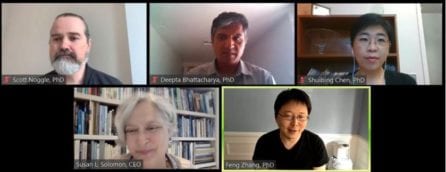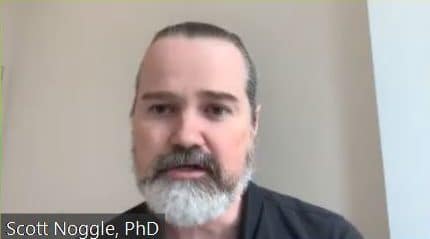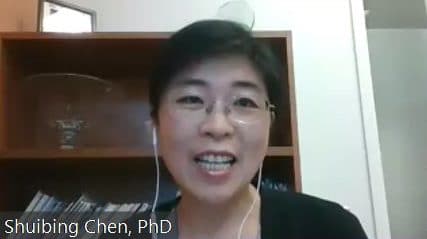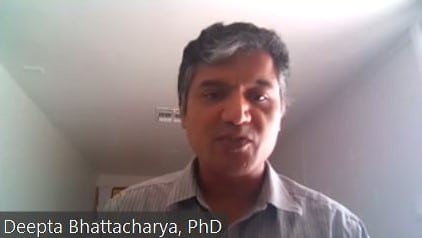New Solutions Are on the Horizon for COVID-19: Here’s How the NYSCF Community is Uniting to Push Them Forward
News VideoThe COVID-19 pandemic has upended society, leaving millions sick and out of work. Fortunately, scientists have started a global race to understand the virus, halt its spread, and bring the world back to a new normal.
Numerous members of the NYSCF community are hard at work on this goal. At a recent panel discussion held as part of NYSCF’s new Virtual Learning and Events program, leading scientists shared promising steps toward tackling the pandemic.

The discussion was moderated by Susan L. Solomon, JD, featured Deepta Bhattacharya, PhD, Shuibing Chen, PhD, Scott Noggle, PhD, and Feng Zhang, PhD.
“Our mission is to use stem cell research to accelerate cures for the major diseases of our time. COVID-19 is undeniably and unfortunately in that category,” remarked Ms. Solomon. “There are so many critical challenges involved, but I’m really optimistic that with the world’s brightest minds working on all of this, we’re soon going to have the real solutions we so urgently need.”
Improving Diagnostics
One of the major issues in tracking and containing the spread of COVID-19 in the United States is a major shortfall in testing. The currently approved test for the SARS-CoV-2 virus requires swabs and several testing ‘reagents’ that are all in short supply; moreover, test results take several days to arrive . Dr. Zhang is working on alternate ‘point-of-care’ testing strategies that leverage the CRISPR gene editing technology he is known for pioneering.
“My laboratory at MIT has been working on a couple of different ways to test,” he explained. “One of them is based on a technique we call SHERLOCK that we developed a couple of years ago. SHERLOCK allows us to make copies of the virus’s signature, combine it with a CRISPR protein, and use that to get a result. The actual test looks similar to a pregnancy test, and it can give a visual readout within an hour.”
Laboratories around the world are now working to validate the use of this test on clinical samples. Another of Dr. Zhang’s projects focuses on mass-processing of self-administered tests.
“The other approach involves DNA sequencing. It allows patients to collect their own samples at home and send them into a centralized facility that can process many samples in parallel, significantly reducing the cost of testing.”
Dr. Zhang is also working on an app aimed at tracking COVID-19 hotspots.
“Myself and my friend Ben Silverman, the founder of Pinterest, started a nonprofit organization called ‘How We Feel’. Through this, we launched a mobile application for iOS and for Android that allows users to anonymously report their symptoms and location. This helps us get a sense of where new outbreaks are happening in the country.”
“I’m fairly hopeful that by combining all these different methodologies, they will help us safely reopen an economy.”
Stem Cells and the Search for New Drugs
Drs. Noggle and Chen are working to understand the virus and find new treatments using the power of stem cells as accessible, patient-specific models of disease.

“The way scientists often study viruses is by looking at them in cell lines that are really good for propagating the virus, but these don’t often recapitulate the cells that are actually infected in the patients themselves,” said Dr. Noggle. “Stem cells allow us to create any type of cell in the body and study how the virus affects it. Having this as a model system is really critical.”
Dr. Noggle is leading a team at the NYSCF Research Institute who is using stem cells to create different lung cell types impacted by COVID-19. NYSCF will make these valuable disease models available to the entire COVID-19 research community to enable investigations of how the virus infects cells, how genetics may make certain people more susceptible to severe cases than others, and test new therapies. He is collaborating with Dr. Chen, who is especially interested in using stem cell models to find effective drugs.
“Most of the drugs we use now are based on expert opinions or very small clinical studies,” noted Dr. Chen. “As a scientific community, we need a very robust model to systematically evaluate different treatments and to understand whether they work, how they work, and how we can improve them.”
Dr. Chen is creating organoids (3D clusters of human tissue made from stem cells) that contain cells susceptible to SARS-CoV-2 infection and using them to test hundreds of drugs already approved for other diseases. Any that show promise in stem cell models can then be advanced toward trials in patients. In later stages of this work, she plans to scale up production of these organoids using NYSCF’s state-of-the-art automation systems, allowing her to test numerous potential drugs at a time.

“We’ve already found some promising hits, including an anti-cancer drug that we are hoping to move into clinical trials,” she remarked.
COVID-19 Immunity: Learning from Antibodies
Dr. Bhattacharya is taking a closer look at SARS-CoV-2 antibodies — immune proteins in the blood that are produced in response to the virus — to track and learn from people who have recovered from COVID-19.
He is developing an antibody test to determine who has been exposed to the virus in different communities, since even those who are asymptomatic will still produce antibodies specific to the SARS-CoV-2 virus.Luckily, Dr. Bhattacharya suspects that immunity to the current strain of the virus could last for a while.

“I can only extrapolate from other infections, corona viruses and other RNA viruses, but usually the duration of immunity is quite robust – typically years. I would say that the bigger challenge isn’t so much a person’s own immune response, but whether the virus mutates and changes over time.”
Importantly, antibody testing will also help us better understand who may be immune and safe to send back to work.
“Those who have been previously infected are likely at a far reduced risk of becoming reinfected, and we can use this as a rational basis for how we reopen the economy. Some of our communities are now, hopefully, getting over that first hump, and we can possibly use this to instruct how to get people back to work.”
A critical measure for stopping the spread and mutation of the virus will be development of a vaccine, which Dr. Bhattacharya’s work could also inform, since knowing which antibodies help fight off the virus will allow scientists to develop treatments that leverage the power of these important proteins.
Accelerating Solutions through Collaboration
As trying as the past few weeks have been, the panelists are optimistic that the widespread collaboration in the scientific community will enable breakthroughs faster than usual.
“I’ve been impressed by how quickly people got started working on this problem,” noted Dr. Noggle. “The wide variety of approaches and collaboration around the world has been really remarkable.”
“I’ve actually been quite pleased with how quickly the scientific community has come together, dropped some of the traditional barriers between academia and biotech and pharma, and thrown competition out the door,” agreed Dr. Bhattacharya.
“This pandemic is devastating, but it has also brought about the most collaborative period of science that I’ve ever experienced,” added Dr. Zhang. “I’ve probably met more people in the last four weeks than I typically would in a year, and everyone who I’ve reached out to about collaborating has been receptive. I think that speaks to how united we are in this fight.”
Learn more about how the NYSCF community is accelerating solutions for COVID-19.
Watch the full discussion below.

